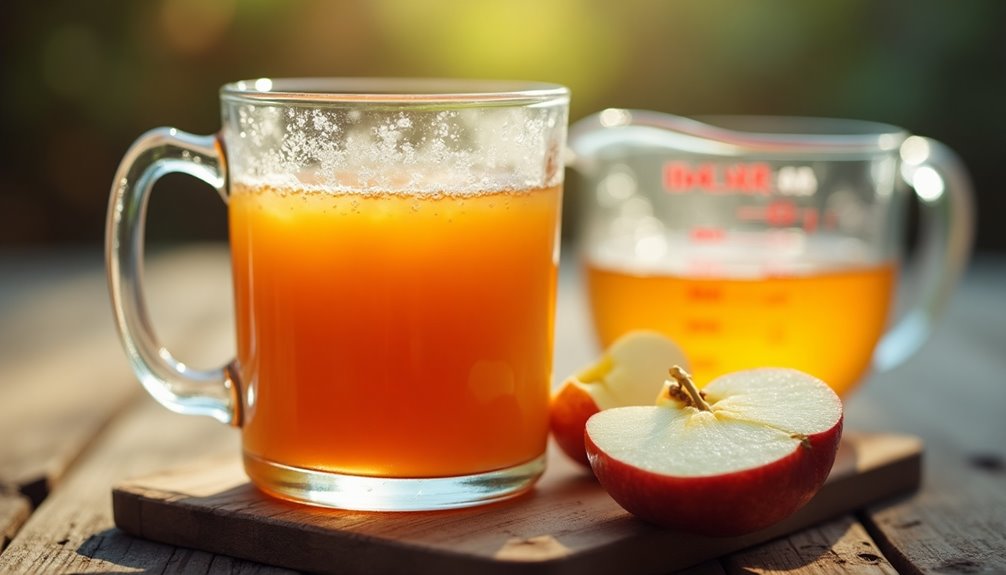A cup of apple juice has about 117 calories, mainly from carbohydrates. With roughly 27.03 grams of sugar, it can be a tasty addition to your diet, but keep an eye on your overall sugar intake. Plus, it provides 31% of your Daily Value for Vitamin C, which is great for your immune health. If you want to learn how apple juice fits into your nutrition plan, there's more to explore.
Key Takeaways
- A standard serving of apple juice is 1 cup, containing approximately 117 calories.
- The majority of calories in apple juice come from carbohydrates, primarily sugars.
- Each cup of apple juice contains around 27.03 grams of sugars.
- Apple juice is low in fat, with only 0.27 grams per serving, and has no cholesterol.
- It provides 31% of the Daily Value for Vitamin C, contributing to overall health.

Ever wondered how many calories are in a cup of apple juice? If you’re looking to keep track of your daily calorie intake, knowing what a serving contributes is essential. A standard serving size of apple juice is 1 cup, which contains approximately 117 calories. When you pour yourself a glass, you’re not just enjoying a refreshing drink; you’re also adding calories to your daily diet. It’s important to be mindful of these calories, especially if you’re trying to manage your weight or maintain a balanced diet. Aside from the calories in apple juice cup, it also contains natural sugars that can contribute to your overall energy intake. While apple juice can be a tasty treat, consider balancing it with whole fruits and vegetables for a more nutritious option.
The calories in a cup of apple juice primarily come from carbohydrates, which make up about 97% of the total calories. So, when you're sipping on that juice, most of what you're consuming is sugar. Specifically, a cup of apple juice contains around 27.03 grams of sugars, which gives it that sweet taste you love. It's important to consider how much a nutrient contributes to your daily intake, especially if you're monitoring sugars as part of your health goals.
Now, if you're wondering how this fits into your overall calorie consumption, it's helpful to remember the concept of Daily Value (DV). The DV tells you how much a nutrient in a serving of food contributes to a daily diet based on a 2,000 calorie per day intake. While your individual needs may vary, understanding the calorie content of foods like apple juice can help you make more informed choices.
Since apple juice is low in fat, with only 0.27 grams of total fat per serving and no cholesterol, it might seem like a healthy option. However, it's crucial to balance those calories a day with other food choices. If you're consuming apple juice regularly, consider how it fits into the bigger picture of your daily diet. For someone aiming to limit sugar intake, knowing that a cup of apple juice contains a significant amount of sugar can help you decide if it's the right choice for you.
In addition to its calorie content, apple juice provides a good source of Vitamin C, offering 31% of the Daily Value in that same cup. This nutrient is essential for your immune system and overall health, so while you enjoy the sweetness, you're also benefiting from some essential vitamins.
Incorporating apple juice into your diet can be enjoyable, but be mindful of how it fits into your overall nutrition plan. Balancing your intake of sugars with other nutrients can help ensure you're meeting your health goals.
Frequently Asked Questions
Is Apple Juice Ok for Weight Loss?
Yes, apple juice can fit into your weight loss plan, but moderation's key.
It's low in fat and cholesterol-free, yet its high sugar content may impact your efforts if you drink too much.
Since it lacks dietary fiber, you mightn't feel as full compared to whole fruits.
To enhance your diet, consider pairing apple juice with whole fruits, ensuring you're mindful of your overall caloric intake for better results.
How Many Calories Are in 1 Cup of 100% Apple Juice?
Curious about calorie counts?
You'll find that one cup of 100% apple juice contains approximately 117 calories. Most of those calories come from carbohydrates, with natural sugars making up a significant portion.
While it's low in fat and cholesterol-free, keep in mind that it also packs around 27g of sugar.
If you're watching your calorie intake, consider how often you're sipping on it throughout your day. Enjoy it in moderation!
How Many Calories Are in an 8 Oz Cup of Apple Juice?
When you're pouring yourself an 8 oz cup of apple juice, you're consuming about 117 calories.
Most of those calories come from carbohydrates, which make up the bulk of the juice.
With around 27 grams of total sugars, it's a sweet treat without any cholesterol and minimal fat.
Just keep in mind that those 117 calories represent roughly 6% of your daily intake if you're following a 2,000 calorie diet.
How Many Calories Are in a Juiced Apple in a Cup?
Picture biting into a crisp, juicy apple, its sweetness bursting in your mouth.
Now, if you juice that apple, you'll find it yields about a cup of liquid gold, brimming with flavor.
In that cup, you'll get roughly 117 calories, primarily from sugars.
While you'll miss out on the fiber, you'll still enjoy a refreshing drink packed with vitamin C.
Conclusion
In the world of beverages, apple juice is like a sweet, refreshing breeze on a warm day. A cup typically contains around 110 calories, making it a tasty treat, but you should enjoy it in moderation. While it's packed with vitamins, those calories can add up quickly, especially if you're watching your intake. So, sip wisely and savor each drop, appreciating the balance between enjoyment and health in every delicious glass.
Cindy thoroughly researches juicing trends, techniques, and recipes to provide readers with practical advice and inspiration. Her writing style is accessible, engaging, and designed to make complex concepts easy to understand. Cindy’s dedication to promoting the advantages of juicing shines through her work, empowering readers to make positive changes in their lives through the simple act of juicing.











